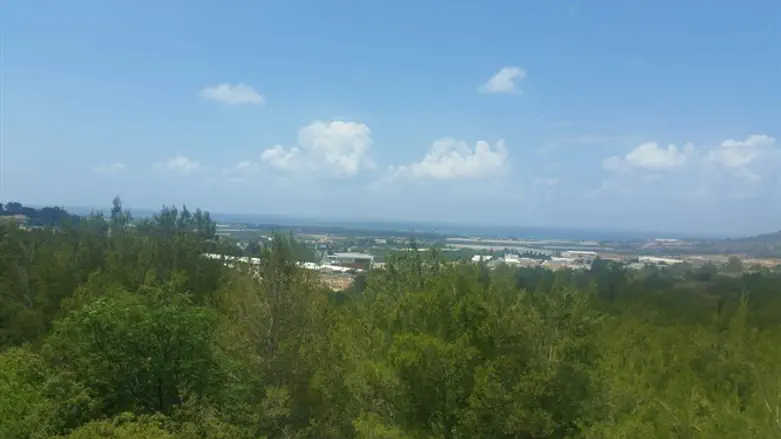
The ancient city of Dan is located in a beautiful and lush valley in Israel's northern Galilee region. Visiting the area today especially in early spring, is to stop to gaze in wonder at nature's paintbrush splashing light and color with gorgeous abandon.
Dr. Richard D. Small has brought that once vibrant city and its still verdant environs to life, writing a compelling book published by Touchpoint Press and available at Google Books, that juxtaposes life in Israel during the first century B.C.E. with the Israel of today. He does it by means of a fast moving plot in which a young Arab, Musa, digging at the archaeological excavations of ancient Dan discovers an urn containing the diary of Elisheva, who lived in Dan during the Second Temple period reign of Hasmonean Queen Shlomzion.
The book is based on historical fact. The Hasmonean ruling dynasty did appoint a woman as queen after her husband the king chose her to rule while on his deathbed. Queen Shlomzion (141-67 B.C.E.) was a pious and dedicated ruler whose 9 year reign was marked by prosperity, peace between the warring Perushim and Saduccee sects and observance of the biblical commandments. Although she spent much time forging alliances to prevent danger to her kingdom, she also improved the quality of life within its borders. With her brother and trusted advisor Rabbi Shimon ben Shetach, the beloved and popular Shlomzion saw to it that schools were opened all over Israel and women's standing improved, leading the Talmudic Sages to use her reign as an example of how the land of Israel prospers when its people observe the commandments given to them by God.
Elisheva's life unfolds throughout the book and is its main story line, while the reader agonizes over young Musa's decision to keep the discovery to himself. Years later, Musa attempts to sell the diary in order to help his relatives escape the current horrendous civil war in a disintegrating Syria. Although he is caught by Israeli security and sentenced to prison, the State of Israel, that treats injured and wounded militants from that debacle without taking sides, finds a way to rescue his family.
And, as a result, "scholars can now decipher the archaeological discovery of the century", one that rivals the Dead Sea Scrolls in its significance – and forms the main part of the book.
Ellisheva, a keen observer and independent thinker, begins writing at the age of ten, continuing up to her death in 43 B.C.E. Human nature doesn't change and woven into her story are the ageless values of love, loyalty, family and friendship that serve to create a full-fledged novel on their own, but the author uses her life to enlighten the reader as to the economic, political and defense issues of the Hasmonean period. Since Elisheva's husband and family deal in the wine and spices trade with nearby Lebanon and the ancient city of Damaseq (today's Damascus), their travels are a source of crucial information on military developments and intrigues to the Judean monarchy and a way for the reader to understand the power struggles of the time.
Rome is extending its net over the Middle East and while that challenge must be met by the empires endangered by its mighty armies, tiny Israel also struggles to preserve its independence. Alliances with stronger powers forged by its rulers are crucial, but can soon turn into a source of danger. Just as it is today, the Promised Land is a bridge between the sea and inland countries and a sought after prize, peopled by a hard-working, stubborn nation that clings to its own traditions, values and heritage, its sacred Temple and commandments.
Daily challenges include marauders and bandits who attack without warning, the unpredictability of nature, life and death, all of this not very different from the challenges Israel faces today – a hostile Iran, terrorists and economic challenges. Elisheva, who marries the son of a Jerusalem trader who shows his courage by saving her disabled friend from a sudden attack, raises her family in Dan and uncomplicatedly describes developments with clear vision and insight.
One of the things I related to most in the book is the author's power of description – as expressed by Elisheva. They bring the period to life and make the reader feel a part of that life. One can almost smell the spices in the markets, taste the mouth-watering dishes prepared using carefully handed down recipe scrolls, take in the pastoral scenery of Dan, the bustling yet holy atmosphere of Jerusalem and the forest-lined paths through the hills to Dameseq.
The book's author, Dr. Richard D. Small, lives in Metulla, the northernmost point of Israel, a short drive from Tel Dan, and can see the hills of Lebanon from his garden. He has a Ph.d. in aeronautical engineering from Rutgers U. and has been internationally recognized for his work in science, especially on the topic of nuclear winter, appearing in the media as well as publishing numerous scientific papers. Upon his retirement to the picturesque Galilee to enjoy his hobbies which include cooking, gardening, carpentry and reading, the versatile and talented father of three grown daughters began to write this, his first, novel. Interestingly, he uses the Hebrew words Ima and Aba for mom and dad, and employs biblical dating as did Elisheva. This dating starts with the year of creation as told in Genesis, making this year 5788.